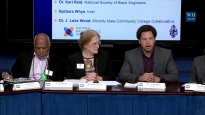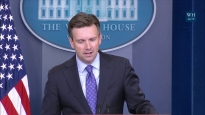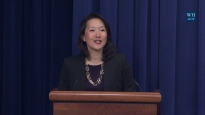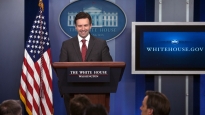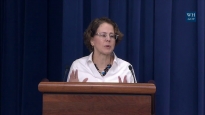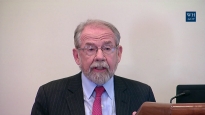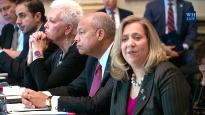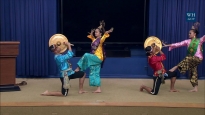Remembering Senator Robert Byrd
July 02, 2010 | 51:26 | Public Domain
President Barack Obama and Vice President Joe Biden speak at a memorial service for Senator Robert Byrd in Charleston, WV.
Remarks by the President and the Vice President at a Memorial Service for Senator Robert C. Byrd
1:09 P.M. EDT
THE VICE PRESIDENT: Bishop, Reverend Clergy, Mona and Marjorie, the entire Byrd family -- if you didn’t already know it, it’s pretty clear the incredible esteem your father was held in. I know you’ve known that your whole life.
To my fellow members of the Senate, you know, I was telling the President, when I got elected the last time and had the great honor of running with the President, I was elected Vice President and United States senator in the same day for my seventh term. And in talking to -- and I got sworn in for that seventh term because we thought we might need a vote there in those first couple weeks. And every time I sat with the Leader -- I never called Senator Byrd “Senator,” I always called him “Leader” -- when I sat with the Leader, I could see that look in his face and he said, “Joe, you sure you’re making the right decision giving up the Senate for Vice President?” (Laughter.) Because as the senators know, he revered the Senate. As Danny Inouye said going into the chamber when we were going in to honor your father, yesterday we walked in together, he said, “You know, Joe, had you stayed, you’d be number two.” I’m still number two, Danny. (Laughter.) I’m still number two.
Ladies and gentlemen, Mr. President, yesterday I had the opportunity to pay my respects to Leader Byrd as he lay in repose in the Senate chamber. I met the family then and again today. And the last time that happened was 50 years ago; the last time that that chamber I revere served as a resting place for anyone was 50 years ago.
But although I and my colleagues behind me revere the Senate, Robert C. Byrd elevated the Senate. Other great men and their families would have chosen for them to lay in state in the Rotunda. But Bob Byrd and his family chose to lay in state in the Senate chamber. And to me, this is completely appropriate, having served with him for 36 plus years. For the Senate chamber was Robert C. Byrd’s cathedral. The Senate chamber was his cathedral, and West Virginia was his heaven. (Applause.)
And there’s not a lot of hyperbole in that. Every person in the Senate, as my colleagues behind you can tell you, brings something special about them. I’ll never forget having privately criticized a senator when I was there the first year. I was sitting with the previous leader, Senator Mansfield, who was an incredible guy. And he told me that -- he said, “Why are you upset?” And I told him about a particular senator railing against something I thought was very worthy, the Americans With Disabilities Act. And he went on to tell me that every member of the Senate represented something in the eyes of their state that was special and represented a piece of their state.
Well, if there was ever a senator who was the embodiment of his state, if there was ever a senator who, in fact, reflected his state, it was Robert C. Byrd.
The fact of the matter is, the pick of the banjo, the sweet sound of the fiddle, ramp dinners in the spring, country fairs in the summer, the beauty of the laurels in the mountains, the rush of the rapids through the valleys -- these things not only describe West Virginia, but from an outsider’s point of view who has been here many times at the invitation of Jennings Randolph and Robert C. Byrd, it seems to me they define a way of life. It’s more than just a state.
And Robert C. Byrd was the fierce -- most fierce defender of not only the state, but the way of life -- I think the most fierce defender that probably this state has ever known in its history.
You know, Robert Byrd did use the phrase, “When I die, West Virginia will be written on my heart.” And I used to kid him, I said, “You have so many Scotch-Irish down there, you don’t acknowledge it was an Irish Catholic named Joyce who said that first.” (Laughter.) Reverend, he quoted everybody else, but when he used that phrase, he’d never acknowledge that it was James Joyce who said, “When I die, Dublin will be written in my heart.” And all he would do is laugh.
The fact of the matter is, West Virginia was not only written in his heart but he wore it on his sleeve. He took such pride in this place. He took such pride in all of you. I remember he asked me, one of the few races he had -- it was a race -- whether I’d come down because I was the young guy and I’d come down and demonstrate to everybody that I could not keep up with Robert C. Byrd, which happened to be true. And I was -- I think, Nick, you were at the dinner. We had a Jefferson-Jackson Day dinner down here, and Robert C. Byrd did something never happened before in all the dinners I’ve spoken at. He stood up and he said, “We’re honored to have Senator Joe Biden from Delaware here tonight, and Joe, I’d like to introduce you to West Virginia.” Then he spent, as Nick will remember, the next probably 10 minutes talking about everyone in the audience by name -- where they were from, what they had done, how they had fought through difficulty. And then he said, kind of like Johnny Carson, “Here’s Joe.” (Laughter.)
Well, I thought it was pretty impressive -- literally. Robert C. Byrd asked me to speak, but he knew the privilege was mine, not the people to whom I was speaking. He was devoted to all of you like few senators in the 37 years I was there, 36 plus years I was there, that I have ever, ever known.
He was fiercely devoted, as you’ve all heard, to his principles. Even once he became power, he always spoke truth to power, standing up for the people he proudly was part of, and you’ve heard it many times today but it bears repeating again, in defense of the Constitution he revered.
I always wear a flag pin, but I was afraid he’d be looking down today because every time I’d wear the flag pin on the floor, he would grab me, take my pin, and put on a Constitution pin. That’s the pin I’m wearing. So, Boss, I’m wearing the pin. (Applause.)
Robert C. Byrd said many things, but he once said, “As long as there is a forum in which questions can be asked by men and women who do not stand in awe of a chief executive, and one can speak as long as one’s feet will allow one to stand, the liberties of the American people will be secure.”
Eleven Presidents knew Robert C. Byrd. He served, as he pointed out, concurrently with them, not under them. (Applause.) And 11 Presidents -- were they all here and two are here -- can attest to the fact that he always showed respect but never deference. And he stood in awe of none.
He had an incredible, prodigious memory that I will not take the time to regale you about. I just remember one time sitting with the Queen of England at a formal dinner, and he recited the entire -- the entire lineage of the Tudors and every year each one had served. And she sat there, and I thought her bonnet was going to flip off her head. (Laughter.) It was like, what did I just hear? She learned about relatives she probably forgot she had. (Laughter.)
As also noted, Robert C. Byrd was a parliamentary library, a keeper of the institution of the Senate, and he was the institution itself. But to me and many people here today, like guys I see, Bill Bradley and Jim Sasser, who long left the Senate for greener pastures, and I hope better remuneration -- we used to kid about that, too -- but I -- for a lot of us, he was a friend, and he was a mentor and he was a guide.
Nick and I were talking a little bit earlier, because Nick -- I commuted every day for 36 years in the United States Senate 250 miles a day. Robert C. Byrd was a stickler about when he’d set votes. And I’d drive down from Washington, and I’d call Nick on this old big old car phone I first had -- it was about that big. And I’d say, “Nick, I can see the dome. Hold the vote, I can see the dome.”
Finally, Nick caught on, he said, “Joe -- Senator -- how far away can you see the dome?” (Laughter.) Because he’d be the one to go to the Leader and say, “Can you hold the vote two more minutes for Biden?” As long as I was behaving, he held the vote. But when I found myself in disagreement, I’d stand there to catch a 7:00 train -- he’d set a vote for 7:00. (Laughter.) And I’d walk up to him and I’d say “I need seven minutes from the chamber.” And Nick knows this -- I’d walk up to him and I’d stand -- I always stood down in the well. And he stood in the first riser, and I’d say, “Mr. Leader, I know there’s no -- we got an hour.” I said, “You set the vote for 7:00. Any possibility for setting it at 10 to 7:00 so I could get the train?” He’d go like this -- he’d look at the clock, look at me, look at the clock and say, “No.” (Laughter.) “No.”
But that’s because I misbehaved once. I voted with George Mitchell on a matter relating to miners and that was a big mistake. (Laughter.) He literally took the roll call sheet -- there’s these sheets, as the staff members know -- with every senator’s name and how they voted. He took the roll call sheet, had it framed, had my name circled in red, and literally -- literally -- had it screwed to the ornate doorframe in his office then as the Chairman of the Appropriations Committee. So every single senator coming to see him would walk out, and at eye height, they’d see Biden circled in red and know darn well they better not vote against Robert C. Byrd ever. (Laughter and applause.) You think I’m joking. I’m not joking.
And then I got in his good graces -- I tried to run for President, he said, “I don’t want any senators running for President.” I said, “Why, Mr. Leader?” He said, “Because you never come back and vote when I need you.” (Laughter.) So I made a promise that no matter where I was, if he called me and said he needed my vote, I’d drop whatever I was doing and I’d come. And I kept the commitment -- the only one I might add. That got me back in his good graces again.
The point is that this is a man who knew exactly what he was doing. After I was elected 1972 as a 29-year-old kid, I was number 100 out of 100 in Senate seniority. And Leader Byrd offered up -- he was then the whip -- he offered his office to me to come down from Delaware so I could have a place to interview staff members. It was in his office, and in the connection his secretary put through, that I received a call telling me that -- about an accident which took the life of my wife and my daughter. And when they were buried, we held a memorial service a couple days later in Delaware where thousands of people showed up, and it was a bone-chilling slate day of rain. And people couldn’t get in the church.
And I never knew it initially, but Robert C. Byrd -- and I think you may have driven him up, Nick -- drove up on his own with Nick to that church. He stood outside for the better part of an hour in a driving rainstorm where the temperature was below 32. When my brother saw him and asked him to come in, he said no; he wouldn’t displace anyone. He stayed there for the entire service. When the service was over, he got in his vehicle and he drove back, never attempting to be noticed, never seeking that to know, as my deceased wife used to say, the real measure of generosity is would you do it and no one ever knew you did it.
Well, Robert C. Byrd did that. I was appreciative of what he did, but I quite frankly didn’t understand till a couple years later I was in his office, and behind his desk was a huge boot cast in bronze. It was Michael’s boot; it was his grandson’s boot. And all of a sudden, it came so crystal clear to me who this guy was. I’d known him, but I understood immediately what he was about. For him it was all about family. It was not just Erma, his beloved wife of 69 years. It was not just his daughters, his grandchildren, great grandchildren -- all of whom are in our prayers today. It was an awful lot of you. I’ll bet if he were here he could look out and name -- name you, and tell you what your father or mother did for him, what your grandmother or grandfather did for him, and how you made such and such of yourself.
Clearly in his own life, Robert Byrd suffered a lot of hardships. You all know the story -- losing his mom, being raised and adopted by an aunt and uncle, growing up in a home without electricity or water, having to work at an early age. He had an incredible, incredible determination, one that I don’t think any of my colleagues have ever witnessed, would be my guess. But, you know, this man was -- it wasn’t just that, as President Clinton pointed out, that at age 47 and as a sitting congressman, he -- or 45 -- he went and got a law degree. I don’t know that you know -- you probably do, Mr. President -- he got that law degree without having a college degree. And at age 77, he went to Marshall University and completed his work, getting his college degree. (Applause.)
Because to him, in my view -- and I don’t know, the family would tell you this -- and to him, I think he felt there was something wrong with the fact that he got the law degree without graduating. He didn’t need that undergraduate degree, but it was Bob Byrd. To quote John Stennis, “Plow into the hedgerow and to the end of the row.”
The remarkable thing about him is he traveled a hard path. He devoted his life, though, to making that path a little easier for those who followed. This is a guy who continued to taste and smell and feel the suffering of the people of his state. He tasted it. That’s why it was so deeply ingrained in him.
It wasn’t just a moral obligation. This guy remembered. And he unapologetically -- as has been pointed out -- did everything to improve the lives of the people of Delaware [sic] by stealing all the money from Delaware, Tennessee, Texas, California, that he could possibly get. (Laughter.)
Remember, Governor, there were two campaigns ago he’s getting beat up for trying to move -- was it two campaigns ago? -- to have the FBI moved down to West Virginia. And the national press was beating him up. And I was on the floor with him. And he just had gotten ripped in a press conference about that. And he -- you know how he used to grab you by the arm, walk you back -- he walked me back, he said, “Joe, I hope they keep throwing me in the briar patch.” (Laughter.)
But I tell you what, you West Virginians owe a lot of people in Delaware for a lot of money we should have gotten and you got. (Laughter.) I just want you to know that. So be nice to the rest of us. (Applause.)
And by the way, if you doubt any of it, you just drive here, you cross the Robert C. Byrd Drive, the Robert C. [Byrd] Appalachian Highway, the Robert C. [Byrd] Library and Learning Center, the Robert C. Byrd Clinic, the Robert C. [Byrd] Federal Building in Charleston and on and on and on.
But, ladies and gentlemen, of course, it’s more than the name we’re not going to forget. It’s his courage. He died like he lived. He died like he lived his life. He never stopped fighting. How many people would have hung on as long as he did? How many people would have the ability to get back out of that hospital bed and get in a wheelchair and come in and vote, vote for this? He never stopped thinking about his people and the things he cared about.
Speaking several weeks ago, this week actually, when Robert Byrd said, “Like Jefferson and Adams, I’m inspired to continue serving the land I love to the very best of my abilities, for the whole of my years.
Well, he served the land he loved. He served the people he loved. He served the people who were in his blood. And because of that service, you had gained greatly. And with his loss, you’re the first who will feel that loss.
But it’s not just West Virginia alone. It’s all of us. I said to him -- I said of him when I learned of his death, I was on an errand for the President in Cleveland, and I said, “You know, to paraphrase the poet, we shall not see his like again.” Had he been there, he would have said, “Joe, that’s Shakespeare, Hamlet, Act I, Scene ii” -- (laughter) -- “and the actual quote is, I shall not look upon his like again.”
Mr. Leader, we’re not going to look upon your like again. I’m not even going to ask God to bless you because he already had and I know where you are. And may God bless your family. May God bless this state and this country. And may God protect our troops. Thank you. (Applause.)
* * * * *
THE PRESIDENT: Thank you. To Mona and Marjorie, and to Senator Byrd’s entire family, including those adorable great granddaughters that I had a chance to meet -- Michelle and I offer you our deepest sympathies.
To Senator Byrd’s friends, including the Speaker of the House, the Majority Leader, the Republican Leader, President Clinton, Vice President Biden, Vicki Kennedy, Nick Rahall and all the previous speakers; Senator Rockefeller for the outstanding work that you’ve done for the state of West Virginia; to his larger family -- the people of West Virginia -- I want you all to know that all America shares your loss. May we all find comfort in a verse of Scripture that reminds me of our dear friend: “The time of my departure has come. I have fought the good fight, I have finished the race, I have kept the faith.”
It’s interesting that you’ve heard that passage from several speakers now, because it embodies somebody who knew how to run a good and long race, and somebody who knew how to keep the faith -- with his state, with his family, with his country and his Constitution.
Years from now, when I think of the man we memorialize today, I’ll remember him as he was when I came to know him, his white hair full like a mane, his gait steadied with a cane.
Determined to make the most of every last breath, the distinguished gentleman from West Virginia could be found at his desk until the very end, doing the people’s business, delivering soul-stirring speeches, a hint of the Appalachians in his voice, stabbing the air with his finger, fiery as ever, years into his 10th decade.
He was a Senate icon. He was a Party leader. He was an elder statesman. And he was my friend. That’s how I’ll remember him.
Today we remember the path he climbed to such extraordinary peaks. Born Cornelius Calvin Sale, Jr. -- Corny, he joked, for short -- his mother lost her life in the Great Influenza Pandemic of 1918. From the aunt and uncle who raised him, amid West Virginia’s coal camps, he gained not only his Byrd name but a reverence for God Almighty, a love of learning that was nurtured at Mark Twain School. And there he met Erma, his sweetheart for over 70 years, by whose side he will now rest for eternity.
Unable to afford college, he did what he could to get by, finding work as a gas station attendant, a produce salesman, a meat-cutter, and a welder in the shipyards of Baltimore and Tampa during World War II. Returning home to West Virginia after the war, he ran for the state House of Delegates, using his fiddle case as a briefcase, the better to stand out on the stump.
Before long, he ran for Congress, serving in the House before jumping over to the Senate, where he was elected nine times, held almost every leadership role imaginable, and proved as capable of swaying others as standing alone, marking a row of milestones along the way. Longest-serving member of Congress. Nearly 19,000 votes cast. Not a single loss at the polls -- a record that speaks to the bond that he had with you, the people of his state.
Transplanted to Washington, his heart remained here, in West Virginia, in the place that shaped him, with the people he loved. His heart belonged to you. Making life better here was his only agenda. Giving you hope, he said, was his greatest achievement. Hope in the form of new jobs and industries. Hope in the form of black lung benefits and union protections. Hope through roads and research centers, schools and scholarships, health clinics and industrial parks that bear his name.
His early rival and late friend, Ted Kennedy, used to joke about campaigning in West Virginia. When his bus broke down, Ted got hold of the highway patrol, who asked where he was. And he said, “I’m on Robert Byrd highway.” And the dispatcher said, “Which one?” (Laughter.)
It’s a life that immeasurably improved the lives of West Virginians. Of course, Robert Byrd was a deeply religious man, a Christian. And so he understood that our lives are marked by sins as well as virtues, failures as well as success, weakness as well as strength. We know there are things he said -- and things he did -- that he came to regret. I remember talking about that the first time I visited with him. He said, “There are things I regretted in my youth. You may know that.” And I said, “None of us are absent some regrets, Senator. That’s why we enjoy and seek the grace of God.”
And as I reflect on the full sweep of his 92 years, it seems to me that his life bent towards justice. Like the Constitution he tucked in his pocket, like our nation itself, Robert Byrd possessed that quintessential American quality, and that is a capacity to change, a capacity to learn, a capacity to listen, a capacity to be made more perfect.
Over his nearly six decades in our Capitol, he came to be seen as the very embodiment of the Senate, chronicling its history in four volumes that he gave to me just as he gave to President Clinton. I, too, read it. I was scared he was going to quiz me. (Laughter.)
But as I soon discovered, his passion for the Senate’s past, his mastery of even its most arcane procedures, it wasn’t an obsession with the trivial or the obscure. It reflected a profoundly noble impulse, a recognition of a basic truth about this country that we are not a nation of men, we are a nation of laws. Our way of life rests on our democratic institutions. Precisely because we are fallible, it falls to each of us to safeguard these institutions, even when it’s inconvenient, and pass on our republic more perfect than before.
Considering the vast learning of this self-taught Senator -- his speeches sprinkled with the likes of Cicero and Shakespeare and Jefferson -- it seems fitting to close with one of his favorite passages in literature, a passage from Moby Dick:
“And there is a Catskill eagle in some souls that can alike dive down into the blackest gorges, and soar out of them again and become invisible in the sunny spaces. And even if he forever flies within the gorge, that gorge is in the mountains; so that even in his lowest swoop the mountain eagle is still higher than any other bird upon the plain, even though they soar.”
Robert Byrd was a mountain eagle, and his lowest swoop was still higher than the other birds upon the plain. (Applause.)
May God bless Robert C. Byrd. May he be welcomed kindly by the righteous Judge. And may his spirit soar forever like a Catskill eagle, high above the Heavens. Thank you very much.
END
1:44 P.M. EDT
|
October 28, 2016
|
October 27, 2016
|
October 27, 2016
|
October 26, 2016
|
|
October 26, 2016
|
October 25, 2016
|
October 24, 2016
|
October 24, 2016
|
- &lsaquo previous
- …
- 11
- 12
- 13
- 14
- 15
- 16
- 17
- 18
- 19
- …
- next &rsaquo
